The Fraying of the American Mind
How Moral Decay and Ideological Extremism Weaken America's Global Standing
The Fraying of America: How Moral Decay Breeds Cultural Vulnerability
October 14, 2023: by Walter Curt
"Nothing turns out to be so oppressive and unjust as a feeble government," Edmund Burke once observed—a statement that resonates with unsettling clarity today. Burke's wisdom, articulated over two centuries ago, serves as a prescient lens through which we can examine the growing malaise that has settled over Western society, particularly America. This is not merely a political issue; it's a profound moral and cultural crisis that has far-reaching implications.
The feebleness Burke warned about is not confined to governmental institutions; it has permeated the very fabric of our society, manifesting as a collective unwillingness to confront and challenge evil. This societal weakness is not just a failure of policy but a failure of virtue, a moral deficiency that leaves us vulnerable both at home and on the global stage. This vulnerability is starkly evident in the surging support for Hamas—a designated terrorist organization—on American college campuses and in cities nationwide. While the Israel-Palestine conflict has always been a hotbed of impassioned discussion, we are now witnessing a marked shift in the dynamics of this debate. Shockingly, even after terrorists attacked Israel, killing women, children, and even babies, students and activists have taken to the streets in support of these actions. This has left many Americans in disbelief, unable to comprehend how their fellow countrymen could endorse such barbarism. The reason for this shocking turn of events is that too few people have grasped the depths to which our moral culture has sunk.
Readers of this publication may be more informed about the antics of radicals, but there are vast swaths of Americans who remain unaware of how far we have truly fallen—and the origins of this decline. To fully understand the depths of this fall, we must first recognize what we have lost. This change is not an isolated incident; it is propelled by intellectual trends that have their origins within the halls of American academia.
At this juncture, it's worth noting the significance of Edmund Burke, an 18th-century Irish statesman and philosopher, often regarded as the father of modern conservatism. Burke's writings have had a profound influence on Western political thought, emphasizing the importance of tradition, moral virtue, and the dangers of radical change. He argued that society is a complex web of relationships and institutions, built over time, and that any attempt to dismantle this structure without understanding its intricacies could lead to chaos. In the context of understanding American and Western values, Burke's insights are invaluable. He reminds us that liberty without wisdom and virtue is a recipe for societal decay.
Burke's words offer us more than a critique; they provide a roadmap for understanding the consequences of societal weakness, a guide to navigating the complex moral and cultural challenges we face today. His insights compel us to examine the roots of our current crisis, to confront the uncomfortable truths we would rather ignore, and to take decisive action where we have been hesitant.
In a world increasingly defined by volatility and moral ambiguity, Burke's emphasis on strength, virtue, and moral clarity offers a timely antidote to the cultural decay that threatens the foundations of our society. It is a call to action that we cannot afford to ignore, for the stakes are nothing less than the future of our nation and the values that define us.
→America's Inability to Confront Evil
The terror attacks in Israel have exposed America's unwillingness to confront evil head-on. While there was an initial surge of public outcry regarding the atrocities committed abroad, that sentiment has already begun to wane, replaced by calls for ceasefires and a return to the status quo. News of unspeakable acts often meets with indifference or rationalizations. On both the right and the left, calls for substantive action are quickly labeled as "warmongering," and discussions about enhanced security measures are dismissed as "fear-mongering." It appears that Americans are more content to ignore gathering threats than to engage with the harsh realities we face.
The avoidance of confronting evil manifests in various troubling ways: willful ignorance regarding global atrocities, silencing dissenting voices, dodging uncomfortable truths, and retreating into self-affirming echo chambers. This isn't merely a calculated stance rooted in the protection of American interests; it is an indication of a culture in decay, devoid of the virtues that once buttressed it. Edmund Burke understood this centuries ago in “Reflections on the Revolution in France” writing:
“The effect of liberty to individuals is that they may do what they please: we ought to see what it will please them to do, before we risk congratulations, which may be soon turned into complaints. Prudence would dictate that in the case of separate, insulated, private men; but liberty, when men act in bodies, is power." (Burke p. 7)
Burke's cautionary words resonate with a profound understanding of human nature and the complexities of liberty. He argues that liberty, especially when exercised collectively, becomes a form of power that can be wielded for good or ill. The key to ensuring that this power serves the common good lies in the moral and intellectual virtues of the citizenry. As he correctly observed, liberty unrestrained by virtue and wisdom is an invitation to societal discord.
Americans enjoy expansive freedoms, but these freedoms are not without their corresponding responsibilities—responsibilities that have been increasingly forgotten in our time. This erosion of moral and intellectual virtue is not accidental; it is the result of a concerted effort to undermine the foundational principles of our society. The radical destruction of our history, the vilification of our past, and the dismissal of our cultural heritage have all contributed to this decline. Shockingly enough, Burke, writing in 1790, foresaw even this reality that has gripped our culture today.
He continues:
“They find themselves obliged to rake into the histories of former ages (which they have ransacked with a malignant and profligate industry) for every instance of oppression and persecution which has been made by that body or in its favour, in order to justify, upon very iniquitous, because very illogical, principles of retaliation, their own persecutions, and their own cruelties.” (Burke p. 136)
Burke's prescience is chilling. He warns that the abandonment of virtue and wisdom would lead to a society where history is weaponized, not as a guide for future conduct, but as a justification for present-day malice and persecution. This is the peril of liberty without restraint—a society that turns on itself, cannibalizing its own foundations in a misguided quest for ideological purity, sound familiar?
This brings us to another crucial point: Modern America confuses liberty with license. The freedom to act is cherished, but the wisdom of such actions is often ignored. Our liberties are not mere accidents; they are the byproduct of a cultural heritage steeped in wisdom and virtue. These liberties were never intended to exist in isolation, detached from the duties and responsibilities that accompany them. Yet, the modern disregard for virtue threatens the very foundations upholding our liberties. As we grapple with this reality, Burke's words serve as a stark reminder of the consequences of such neglect:
“But what is liberty without wisdom, and without virtue? It is the greatest of all possible evils; for it is folly, vice, and madness, without tuition or restraint. Those who know what virtuous liberty is, cannot bear to see it disgraced by incapable heads, on account of their having high-sounding words in their mouths.” (Burke p. 241)
Unchecked liberty devolves into vice and madness. America was built upon moral restraint and wisdom. But decades of moral relativism and rejection of traditional values have corroded our cultural pillars. The effect is a society drifting into nihilism, unable to agree on basic truths. With no shared moral anchor, disputes grow intractable and trust evaporates. Burke’s warning of liberty without wisdom has become reality.
The erosion of wisdom and virtue in American society has real-world implications that extend beyond mere philosophical debates. When a society loses its moral compass, it becomes paralyzed, unable to discern right from wrong and thus incapable of taking decisive action against evil. This paralysis manifests as inaction, a dangerous state that Edmund Burke warned against. When we fail to act because we lack a shared moral framework, we create a vacuum that evil is all too eager to fill. It's not just that we risk making poor choices; it's that we risk not making choices at all, allowing evil to triumph by default.
→The Cost of Inaction
In a society clouded by moral relativism, where the lines between right and wrong are increasingly blurred, the cost of inaction becomes devastatingly high. This absence of a shared moral compass not only cripples our capacity to confront evil but also gives license to those who commit it. It's a self-perpetuating cycle that undermines the bedrock of a just and free society. Edmund Burke grasped this unsettling truth centuries ago. This brings us to a quote frequently attributed to him, yet one that has been distorted by the annals of history. Both the commonly cited version and Burke's original words warrant close examination.
“The only thing necessary for the triumph of evil is for good men to do nothing.”
This phrase, while commonly attributed to Burke, was actually popularized by President John F. Kennedy. It succinctly captures the danger of inaction and serves as a stark reminder that the absence of resistance from morally upright individuals creates a vacuum that evil is all too eager to fill. This quote lays bare the moral imperative for those who recognize injustice to take a stand, lest their silence be mistaken for complicity.
However, it's essential to delve into Burke's original phrasing, found in his work "Thoughts on the Cause of the Present Discontents," for a richer, more nuanced perspective on the issue:
“No man, who is not inflamed by vain-glory into enthusiasm, can flatter himself that his single, unsupported, desultory, unsystematic endeavors are of power to defeat the subtle designs and united cabals of ambitious citizens. When bad men combine, the good must associate; else they will fall, one by one, an unpitied sacrifice in a contemptible struggle.” (Burke p. 92)
Here, Burke not only emphasizes the peril of inaction but also underscores the collective responsibility we bear. It's not enough for individuals to act in isolation; there must be a concerted effort, an association of the good, to effectively counteract the forces of evil. In a society increasingly fragmented by ideological divides, this call for unity among those committed to moral integrity is more relevant than ever. It serves as a sobering reminder that the fight against evil is not a solitary endeavor but a collective one, requiring us to set aside our differences and come together in pursuit of a higher moral purpose.
Burke emphasizes the urgency for the “good” to unite against evil. If not, they will fall unnoticed and unmourned in a “contemptible struggle.” Both versions warn that ignoring evil brings ruin, but Burke’s quote underscores the necessity of association and unity among the good.
In the face of growing threats, both domestic and international, the unity that Burke advocates for is not merely a moral imperative but a strategic necessity. A divided America is a weakened America, vulnerable to exploitation by those who would do us harm. Unity, then, is the bedrock upon which American strength is built. It is this strength—moral, cultural, and yes, military—that enables America to confront evil and maintain global stability. Without it, we risk not only our own freedom but also the stability of a world that looks to America as a beacon of democracy and justice.
→The Necessity of Strength
Burke's wisdom serves as a timeless reminder that strength is not merely a function of military might but also of moral and intellectual fortitude. In a society where virtue is increasingly dismissed, the strength to stand against evil becomes diluted. This is not just a failure of policy but a failure of character, a moral deficiency that leaves us vulnerable to the very evils we ought to be combating. It is a collective failure that begins with the individual—a failure to uphold the duties and responsibilities that come with freedom.
Returning to "Reflections on the Revolution in France," Burke again offers a poignant insight into this issue:
“Society cannot exist unless a controlling power upon will and appetite be placed somewhere, and the less of it there is within, the more there must be without. It is ordained in the eternal constitution of things, that men of intemperate minds cannot be free. Their passions forge their fetters.” (Burke p. 282)
This observation is not merely a historical footnote; it is a diagnosis of our current cultural malaise. Years of dismissing moral wisdom and virtue have bred an intemperate society unable to preserve its own liberty.
American freedom is not just a product of military might but is secured by citizens committed to upholding the duties that freedom demands. To shrug off this responsibility is to lose freedom itself. As we've been warned, "Evil triumphs when good men do nothing." This isn't just a catchy phrase; it's a cautionary principle that we ignore at our peril.
In a world where threats are not confined by borders, America can't afford to hide behind its oceans, turn off its TVs, and pretend that the world's problems don't affect it. As the global superpower, America has a solemn duty to confront evil and uphold justice. Yet, public opinion increasingly spurns this obligation, preferring isolationism to continued engagement overseas. This is not merely a failure of policy but a failure of national will, a retreat from the very principles that have made America a beacon of freedom and justice in the world.
Such attitudes are dangerously naive. America’s adversaries are watching and stand ready to exploit perceived weaknesses. If America retreats from its global leadership role, the consequences could reshape the world in deeply threatening ways.
This isn’t fear-mongering; it’s reality. The future global order hangs delicately in the balance. America is a pillar upholding stability and democracy, but pillars can crumble from rot within. Years of underestimating threats and indulging internal divisions have weakened the foundations upholding American power. Enemies are poised to kick apart those pillars altogether.
Burke's warnings against morally unrestrained societies ring true today. America enjoys immense liberties, but these demand wisdom and virtue to sustain. Years of dismissing objective truth and traditional values have corroded America's cultural pillars. The result is a society adrift, unable to agree on basic moral standards.
This moral confusion breeds weakness, not just domestically, but globally. America seems increasingly unwilling to confront gathering threats or uphold justice abroad. But evil gains ground in the absence of resistance from men and women of moral courage.
→Ideological Drift: The Dangerous Alliance of Critical Theory and Terrorism
It's crucial to understand that this weakening of America's moral fiber is not happening in a vacuum. To fully grasp phenomena like college students cheering Hamas on American campuses, we must delve into the academic doctrines that have shaped contemporary thought. Foremost among these is Critical Theory, a discipline that emerged in the early-to-mid 20th century as an offshoot of the Frankfurt School. Initially conceived as a critique of societal structures aimed at identifying and rectifying systemic inequities, Critical Theory has undergone a significant transformation.
No longer merely an academic tool for social critique, it has morphed into an ideological juggernaut with implications that extend far beyond the boundaries of academia. This ideological drift has not only influenced public opinion but has also created a dangerous alliance between intellectual trends and extremist ideologies, further exacerbating America's moral and cultural crisis.
→Critical Theory
In its early stages, Critical Theory aimed to bring the precision of empirical research into the realm of social critique. It held the vision that, by doing so, a more just society could be realized. Yet this focus on empirical data, while seemingly rigorous, actually sowed the seeds for its own downfall. The modern avatar of Critical Theory, often referred to as Critical Social Justice, has not only diverged from its original intent but has also mutated into a form that indiscriminately delegitimizes any social structure it identifies as perpetuating inequality. In doing so, it often overlooks the nuances and complexities inherent in these structures. Most concerning, however, is how it has started to erode the liberal ideals that value individual agency and the ability to engage in reasoned discourse.
Richard Weaver, in "Ideas have Consequences," warns us about this very predicament:
“From this comes a most important symptom of our condition, the astonishing vogue of factual information. It is naturally impossible for anyone to get along without some knowledge that he feels can be relied on. Having been told by the relativists that he cannot have truth, he now has “‘facts.’’ One notes that even in everyday speech the word fact has taken the place of truth; ‘‘it is a fact’’ is now the formula for a categorical assertion. Where fact is made the criterion, knowledge has been rendered unattainable. And the public is being taught systematically to make this fatal confusion of factual particulars with wisdom.” (Weaver p. 58)
The overemphasis on factual information at the expense of deeper truths has allowed extremism to flourish, particularly in our academic institutions. Activists and scholars, armed with isolated facts, reduce the complex Israel-Palestine conflict to a simplistic narrative of oppressor versus oppressed. They cite statistics about the lack of clean water or high unemployment rates in Palestine, stripping these facts of their broader context and complexity.
Weaver's insight reveals the inherent flaw in Critical Theory's approach. By prioritizing facts over enduring truths, it ironically narrows the scope of genuine knowledge. The result is a worldview that, while purporting to advocate for justice, loses sight of the more nuanced and comprehensive understanding of justice and fairness. This myopic focus on facts, divorced from deeper truths, leaves Critical Theory not only vulnerable to its own internal inconsistencies but also open to manipulation for purposes far afield from its original intent of social justice.
Indeed, the theory's modern iteration, known as Critical Social Justice, strays significantly from its original purpose of using empirical rigor to critically examine social systems for the greater goal of social equity. Instead, it has evolved into a mechanism that indiscriminately devalues any institution or system it identifies as perpetuating inequality, often without due consideration for the complexities that are intrinsic to these structures.
A case in point is the state of Israel. Under the lens of Critical Social Justice, Israel is simplistically labeled as the oppressor, and the conclusion is that it must be reduced or even destroyed for not adhering to the doctrine of equity. This perspective grossly overlooks the intricate geopolitical, historical, and cultural factors that shape the Israel-Palestine conflict, reducing it to a one-dimensional narrative that serves neither the cause of justice nor the pursuit of truth.
One disconcerting development that amplifies these shortcomings is the concept of "positionality." This idea, which is gaining prominence in the sphere of Critical Social Justice, posits that the validity of one’s perspective is primarily determined by their social and cultural background.
This ideological shift, as noted by James Lindsay, has ominous implications:
“These are evil ideas that are new only in their outermost manifestation: “whiteness,” “colonizer,” “settler.” They, are anti-Semitism that, like their predecessors, are the results of forcing bad solutions to fundamental contradictions that necessarily arise from within the bowels of impoverished and illiberal social theories. In liberalism, as Weiss observes, we have at the heart “the idea that we should judge each person not by their station or their family lineage but by their deeds” and “that human beings have agency,” which she also notes “are revolutionary ideas that are, at root, Hebrew ones.” In Theory, one’s station—called “positionality”—is the main dimension of judgment and human beings who lack a critical consciousness—who aren’t “Woke” and in agreement with Theory—necessarily have a false consciousness, like “internalized dominance,” and no true agency.” “Critical Race Theory’s Jewish Problem” - Lindsay
This analysis is deeply troubling. It shows how Critical Theory has forsaken liberal principles that emphasize judging individuals by their actions and the content of their character. This ideological shift towards "positionality" not only undermines these principles but also creates an opening for groups like Hamas. By portraying the Palestinian people as the ultimate 'marginalized' group, they tap into the sympathies nurtured by Critical Theory, notwithstanding their documented history of terrorism and human rights abuses. Such distortions dangerously blur the lines, allowing agendas far removed from genuine social justice to gain undue influence.
This reconfiguration of Critical Theory prioritizes ideological conformity over empirical evidence. It leads to a form of selective blindness that dismisses complexities that don't align with its established narrative. This could be the intricate history of Jewish suffering or the nuanced geopolitics of the Middle East—factors often relegated to the margins to favor a simplified story of oppressor versus oppressed. This selective engagement with reality grants groups like Hamas a veneer of legitimacy, allowing them to frame their actions in the language of liberation and resistance.
The implications of this ideological drift resonate deeply within academia, where the very foundations of knowledge and ethical instruction are being recalibrated. C.S. Lewis, in "The Abolition of Man," eerily foresaw such a development:
“In the older systems both the kind of man the teachers wished to produce and their motives for producing him were prescribed by the Tao—a norm to which the teachers themselves were subject and from which they claimed no liberty to depart. They did not cut men to some pattern they had chosen. They handed on what they had received: they initiated the young neophyte into the mystery of humanity which over-arched him and them alike. It was but old birds teaching young birds to fly. This will be changed. Values are now mere natural phenomena. Judgements of value are to be produced in the pupil as part of the conditioning.” (Lewis p. 74)
Lewis' words serve as a stark warning. The shift away from universal principles to ideological conditioning is not merely an alteration in academia but signifies a deeper transformation in how humanity perceives itself. In such an academic environment, ideologies like Critical Theory find fertile ground to flourish, effectively upending traditional norms and muddying the quest for nuanced and truthful understanding.
Further echoing this sentiment, C.S. Lewis provides another layer of caution in "The Abolition of Man":
“We may legitimately hope that among the impulses which arise in minds thus emptied of all ‘rational’ or ‘spiritual’ motives, some will be benevolent. I am very doubtful myself whether the benevolent impulses, stripped of that preference and encouragement which the Tao teaches us to give them and left to their merely natural strength and frequency as psychological events, will have much influence. I am very doubtful whether history shows us one example of a man who, having stepped outside traditional morality and attained power, has used that power benevolently. I am inclined to think that the Conditioners will hate the conditioned.” (Lewis p. 78)
These words illuminate a critical flaw in the trajectory of modern academia. By stepping outside of traditional morality—what Lewis terms the "Tao"—the quest for understanding has been reduced to a power play devoid of rational or spiritual safeguards. This devolution renders Critical Theory an ideological framework ripe for exploitation by groups whose objectives are far from benevolent. The real-world implications of this are grave; among them is the troubling ease with which extremist organizations find ideological camaraderie within American academic institutions.
→The Consequences
Far from being merely the shortcomings of a single academic theory, this moral and intellectual decay reflects a broader failing within the academic community itself. Those in academia—the 'Conditioners' in Lewis's parlance—appear more vested in the ideological purity of their theories than in scrutinizing the real-world harm such theories have enabled, revealing a disturbing lack of foresight and ethical responsibility.
The disconcerting reality is that academia's current trajectory has given rise to a student body increasingly detached from nuanced understanding and ethical considerations. This detachment manifests most alarmingly in the radical stances some students adopt. Armed with a misguided interpretation of Critical Theory, they take to the streets and campuses, vociferously advocating for the destruction of Israel, all under the banner of fighting against perceived oppressors.
This isn't just a fringe phenomenon anymore; it has permeated mainstream academic discourse. When students label Israelis as the 'oppressors,' they're not merely offering an interpretation of a complex geopolitical issue; they are also cultivating a divisive, and outright harmful atmosphere on campus. The reach of this ideological current extends beyond academic debates and peaceful protests, seeping into broader social movements. For example, Black Lives Matter posted an image in "support" of Palestine that unwittingly featured a paraglider, the very method Hamas used to slaughter civilians at a rave. Within this distorted framework, calls for justice transform into endorsements of extremism and violence. Such alliances not only muddy the intellectual waters but also risk normalizing hate and terrorism under the guise of activism.
The implications are deeply troubling. Academia, which ought to be a bastion for rational discourse and moral integrity, is becoming a breeding ground for extremism under the banner of social justice. This is not merely an issue of misguided youth but a systemic failing, implicating the very educators and institutions that propagate these theories. And so, we find ourselves at an ethical impasse: the very Conditioners warned of by Lewis are enabling a narrative with far-reaching, destructive consequences.
The result is that colleges and universities are losing control of the narrative, and in doing so, they have lost their role as places of balanced education and nuanced thought. When academic institutions become echo chambers for radicalism, the repercussions are felt far beyond the boundaries of the campus. It creates a volatile environment that undermines social cohesion and threatens our political stability, calling into question the fundamental principles that guide modern educational institutions.
→We Must Go Back
America stands at a crossroads. Years of division and denial have weakened its ability to lead. Its enemies are poised to exploit these cracks in America's foundation. But it’s not too late to reinforce those foundations. Americans must rediscover the resilience, vigilance and unity that built and sustained this nation. There are no quick fixes or easy answers. But this cultural renewal must begin with individuals committed to moral clarity and courageous action. In an unstable world, strength and virtue at home are America’s best bulwark abroad.
So, where do we turn to mend this academic and cultural decay? Interestingly, the way forward may lie in a journey back through time—to a period before these radical currents permeated our educational systems. The Educational Policies Commission, in their 1937 publication "The Unique Function of Education in America," offers valuable insights that could serve as a robust defense against the distressing trends we witness today.
“It is out of the historical development of American society that have come the ideas, aspirations, knowledge, and working rules which prevail today and set the task of education. There have been borrowings, of course. Beyond the founding of the Republic lies a vast background embracing the culture of antiquity, the Middle Ages, the Renaissance, and modern Europe. From this plenitude of resources American civilization has been enriched. But all that has been drawn from other times and places has been worked into the American heritage. Additional drafts may be made upon other nations in days to come. Research will bring new knowledge. Experiments may confirm new methods. Novel ideas may bid for favor. The spirit of inquiry and invention may be active. The aspirations of the living will be stirred by the eternal surge of the human heart. Even so, the past, distant and near, has given us our society, including all the material, intellectual, and moral manifestations with which education must work.” [Educational Policies Commission.“ “The Unique Function of Education in America.” Washington, D.C. 1937. p. 9]
It’s time to set aside differences and distractions. America must rediscover the resilience, vigilance and strength that secured its preeminent position. There’s too much at stake to indulge timidity and denial any longer. In this pivotal moment, America must choose strength over weakness, action over inaction, and reality over comforting illusions. The future of the nation—and indeed the world—depends on it.
What the Commission so aptly recognizes is the foundational principle that education should be an organic extension of society's historical and cultural heritage. It should not be a breeding ground for ideological radicalism that seeks to rewrite the past and reframe the present through a narrow and selective lens. Instead, education should aim to enrich and illuminate, guided by the collective wisdom and moral integrity handed down through generations.
By revisiting the wisdom encapsulated in this near century-old document, educational institutions could regain their role as places of balanced education and nuanced thought, rather than echo chambers of radicalism. This requires an unflinching commitment to intellectual honesty, moral responsibility, and an ethos that places the pursuit of truth above ideological conformity.
→The Path Forward: A Call to Moral and Intellectual Renewal
As Edmund Burke astutely observed, liberty without wisdom and virtue is a perilous path leading to societal decay. The cultural malaise afflicting America today is a manifestation of this decay. Years of undermining objective truths and traditional values have eroded the foundational pillars that sustain our nation.
The disturbing rise of extremist ideologies, fueled by academic currents like Critical Theory, are not mere anomalies; they are symptomatic of a deeper, more pervasive corrosion. These are not isolated incidents but rather glaring indicators that our moral and intellectual foundations are in dire need of reinforcement.
The way forward lies in both individual and institutional renewal. Academia, in particular, must recommit itself to the timeless quest for truth, reclaiming its role as the intellectual and ethical bedrock upon which our society is built. Achieving this will necessitate moral courage and an unwavering commitment to balanced inquiry over ideological dogma. Only then can we hope to restore the strength and integrity that our society so desperately needs.
But the ultimate responsibility for societal renewal rests with each and every citizen. We must not only demand but also embody a public ethic rooted in virtue, wisdom, and accountability. Our disagreements, while inevitable, must be anchored in a mutual acknowledgment of the existence of truth, even if we differ on its particulars. Heeding Burke's counsel to associate in a common cause guided by moral clarity is not just advisable—it's imperative.
The challenges that lie ahead are indeed formidable, especially when the forces of societal decay are left unchecked. Yet history shows that great societies have faced similar trials and emerged stronger for it. A revival of our cultural heritage, emphasizing individual agency and ethical action, offers a blueprint for renewal. By anchoring ourselves to these enduring values, we can rekindle the moral light that guides us forward.
We find ourselves at a critical crossroads, one that requires us to confront uncomfortable truths unflinchingly. The trajectory of our nation is at stake, and the choices we make today will reverberate through future generations. However, if we rise to meet these challenges with courage, unity, and a sense of moral purpose, we can guide America back to a foundation of ethical integrity. In doing so, we ensure that the choices we make today will be ones that future generations can regard with gratitude rather than regret.
There is no shying away from this monumental responsibility. It is in this very struggle that we find the renewal of our national spirit. For in the end, darkness stands no chance against the light, provided that brave souls are willing to shine it. This is the fight of our generation—to once again be those brave souls who illuminate the path forward.


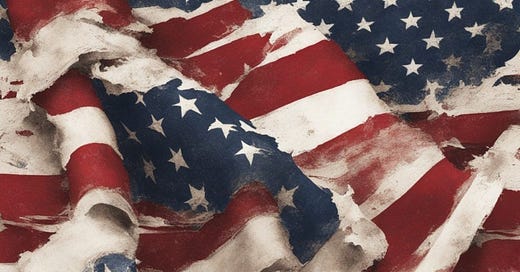


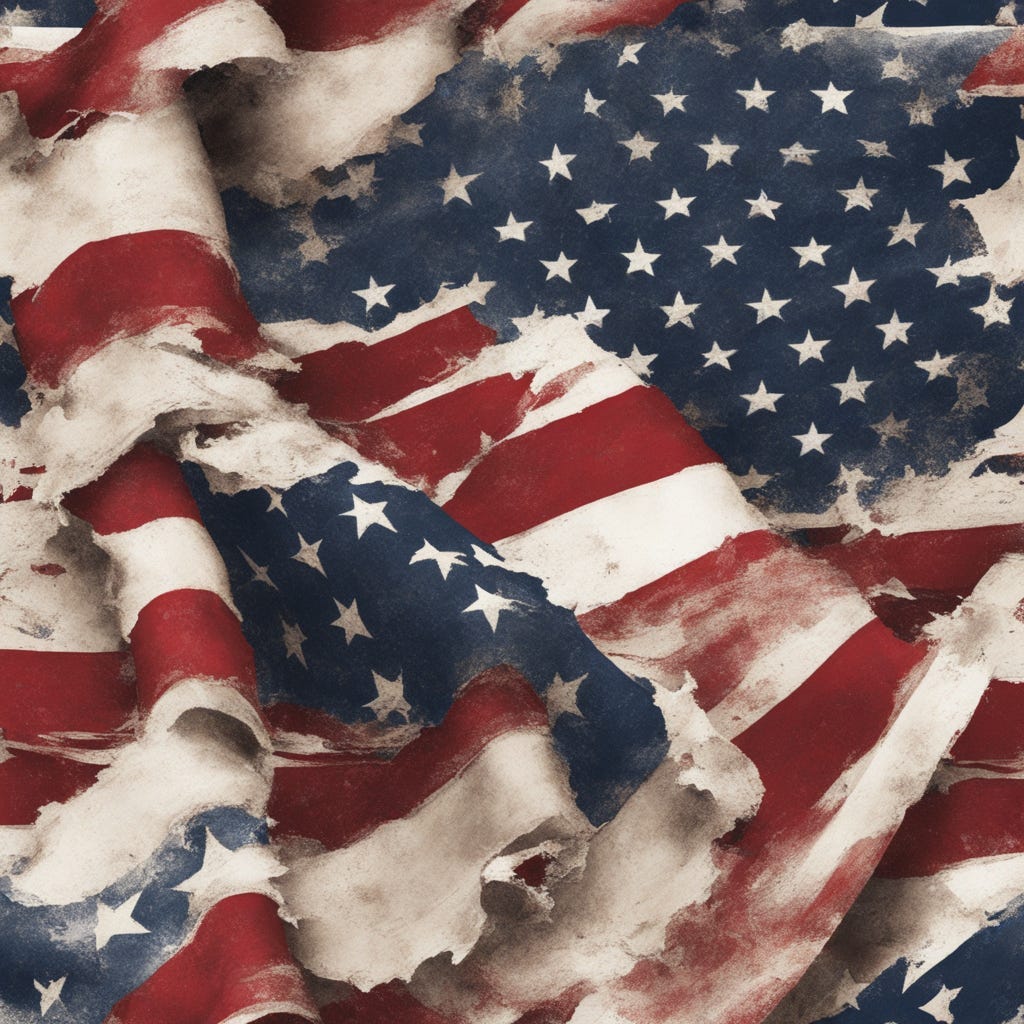
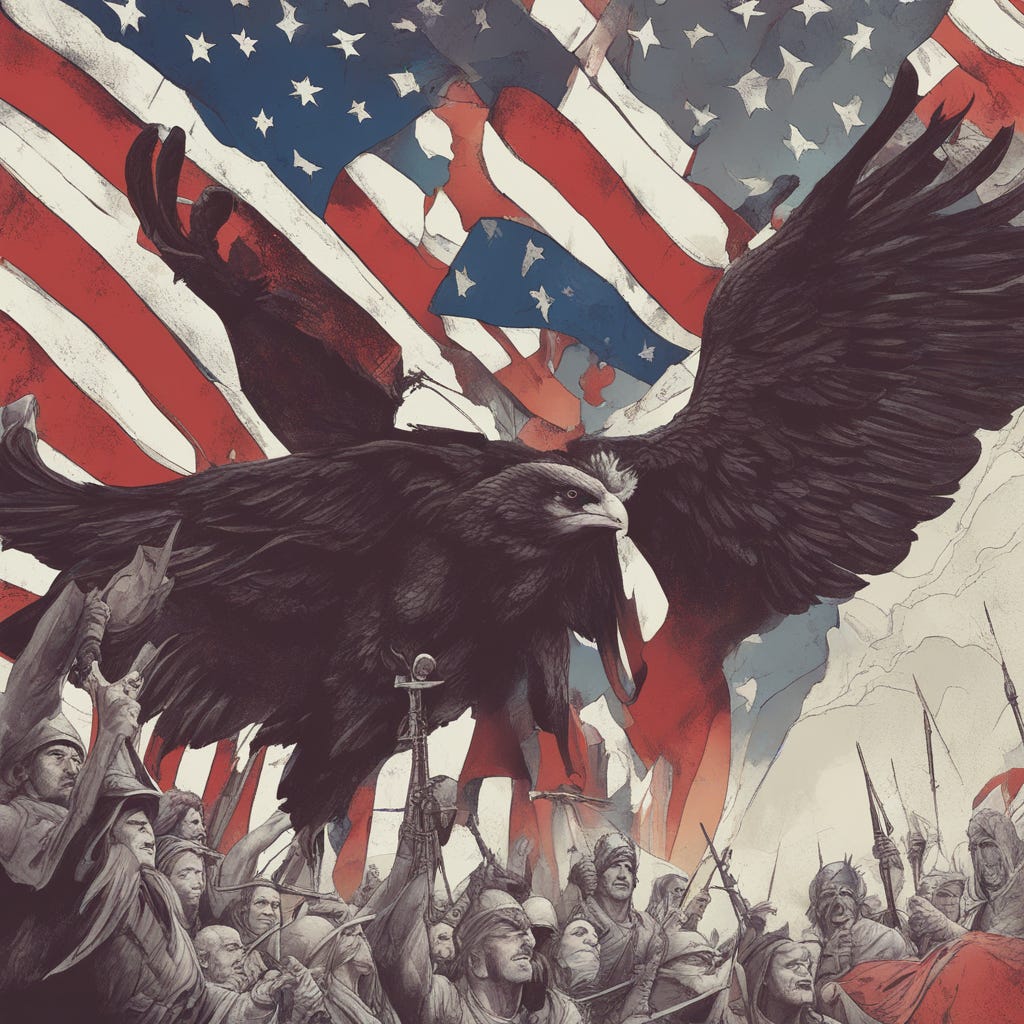
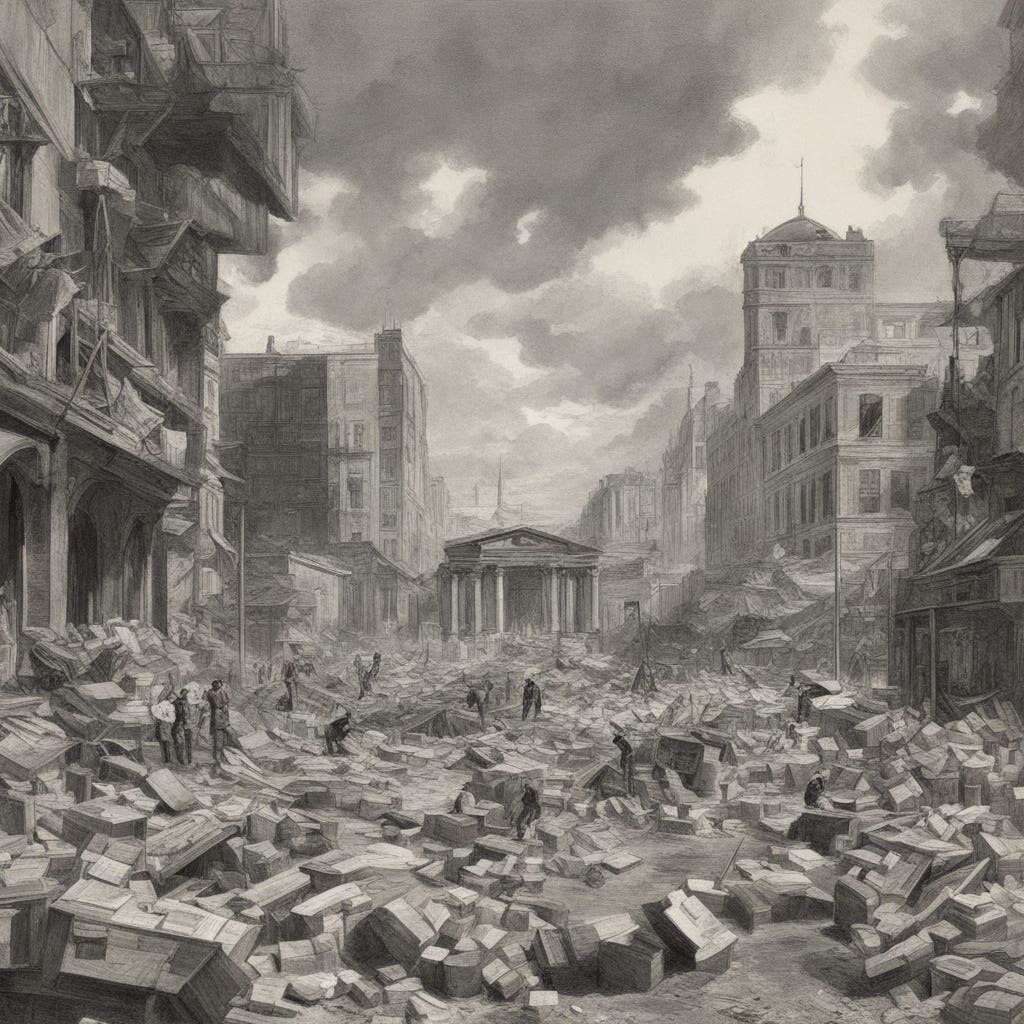
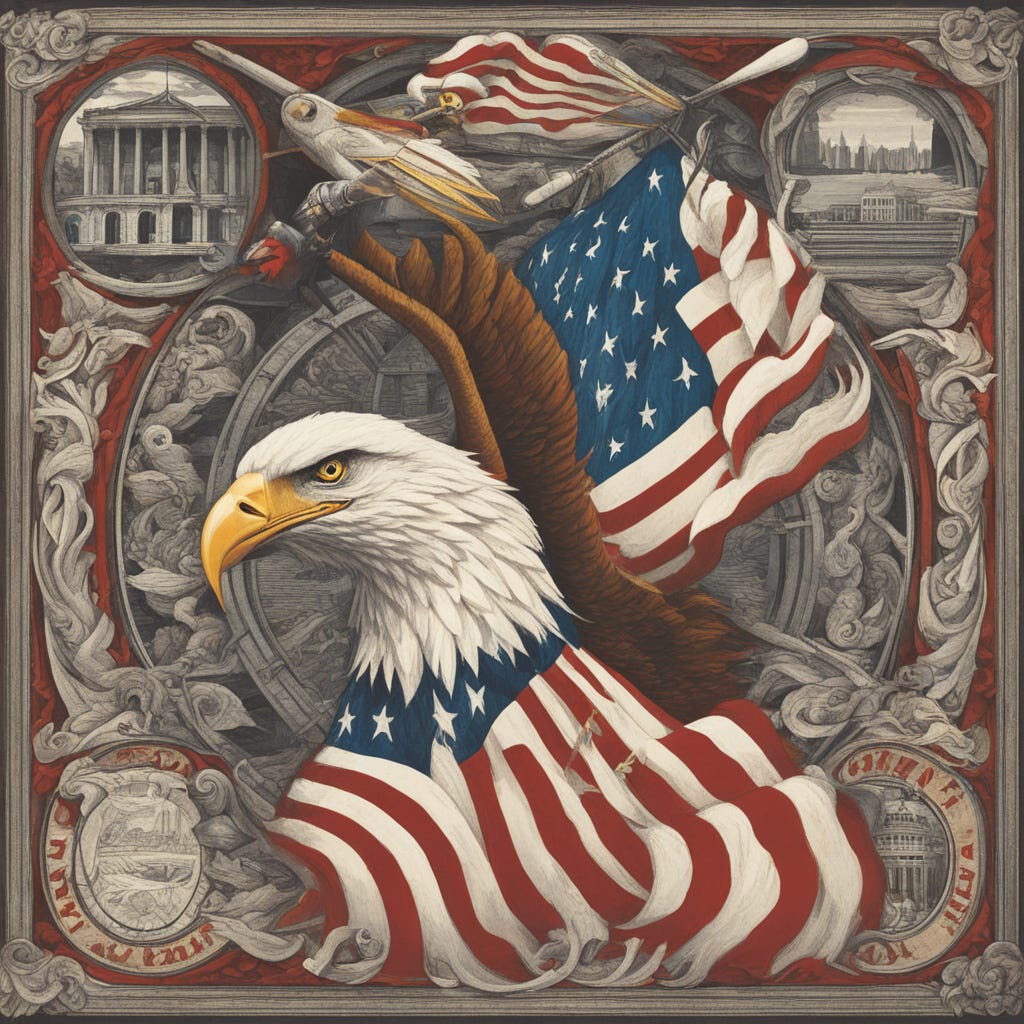
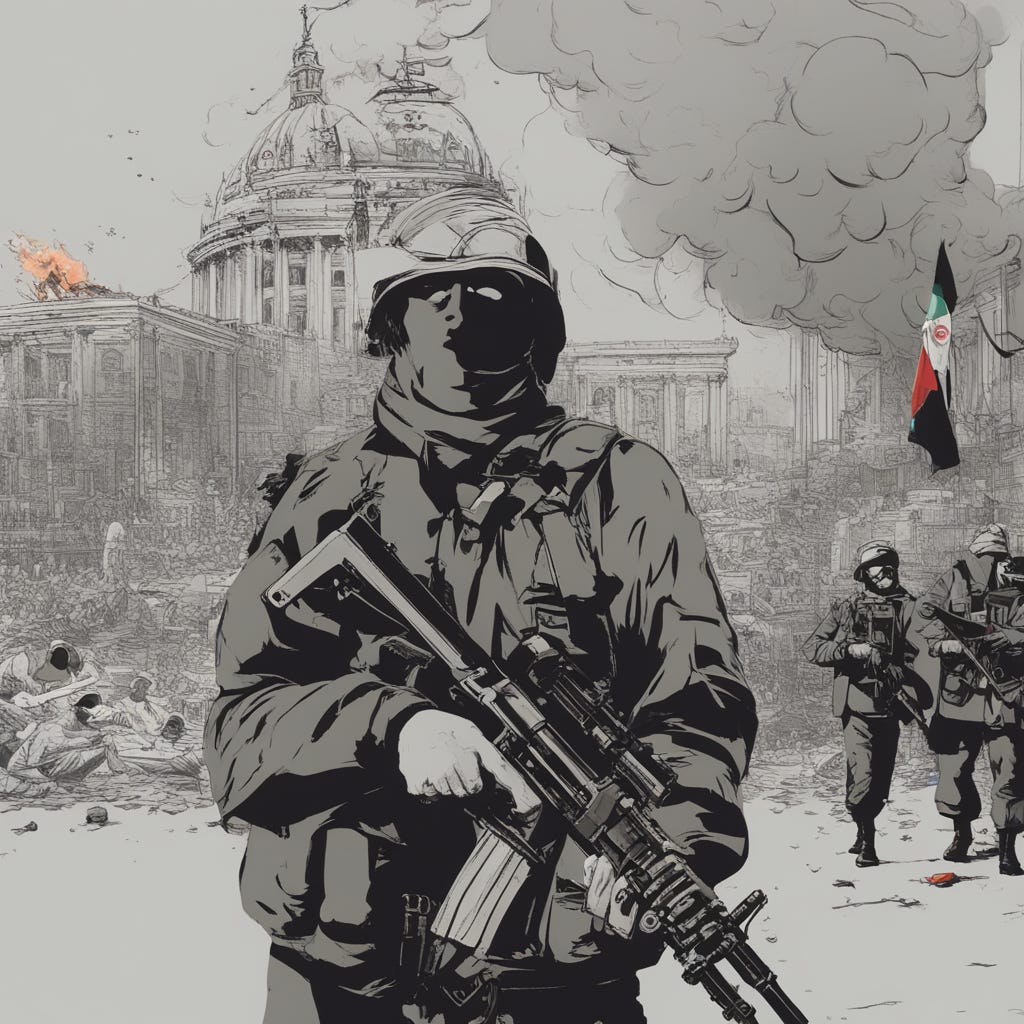

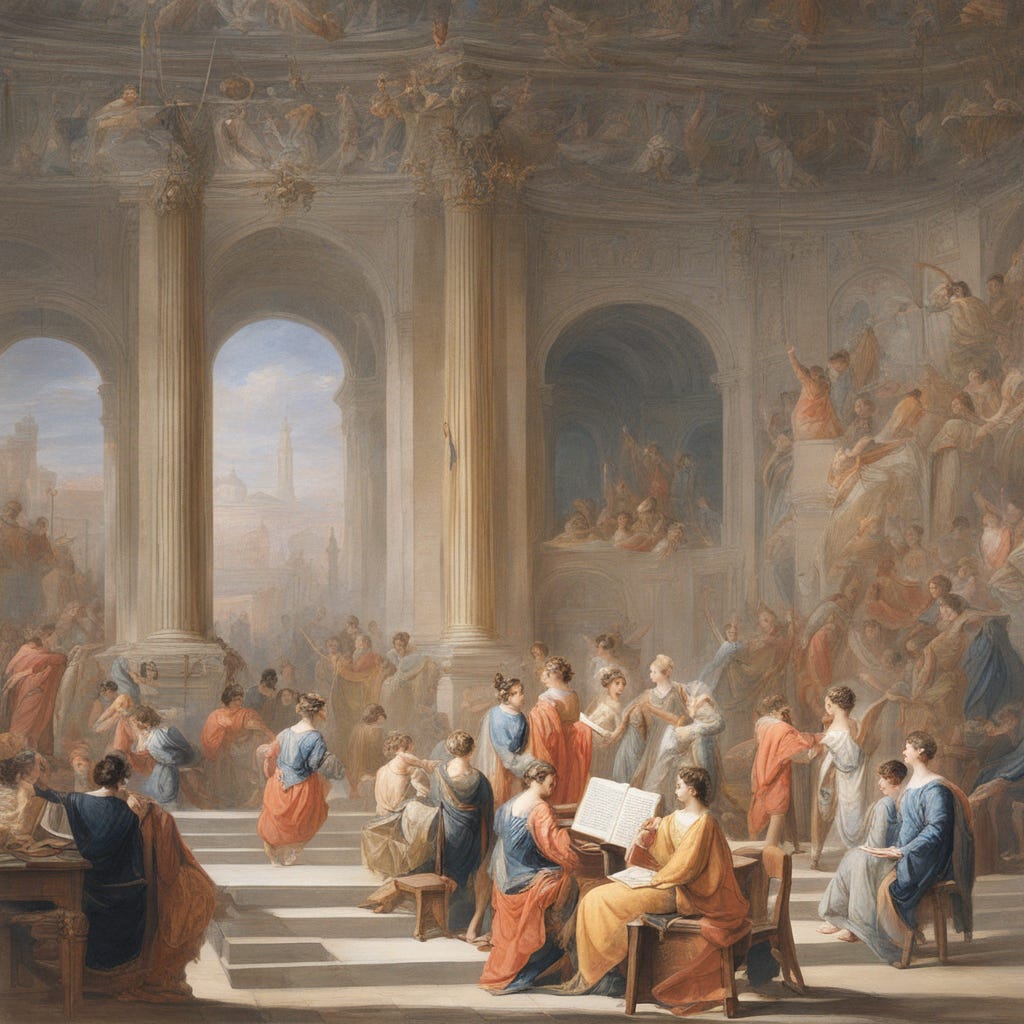
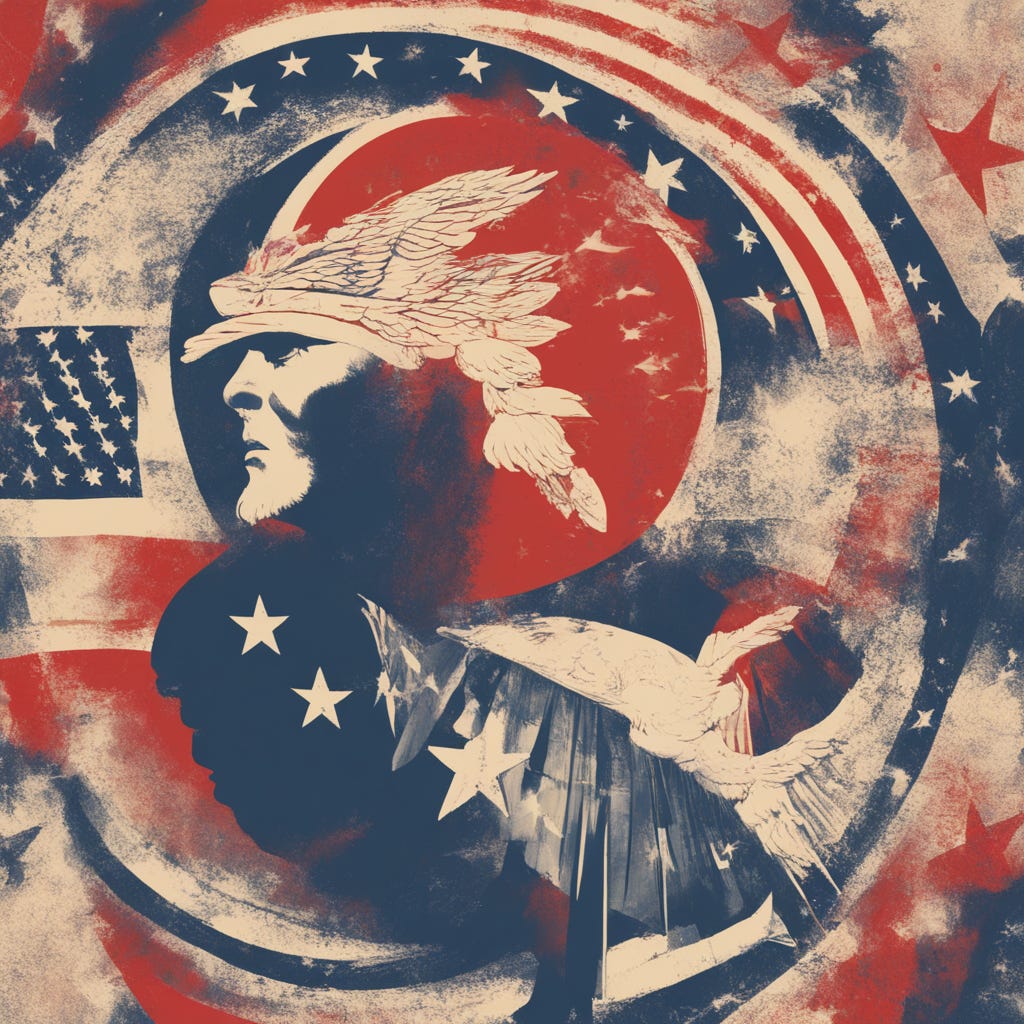
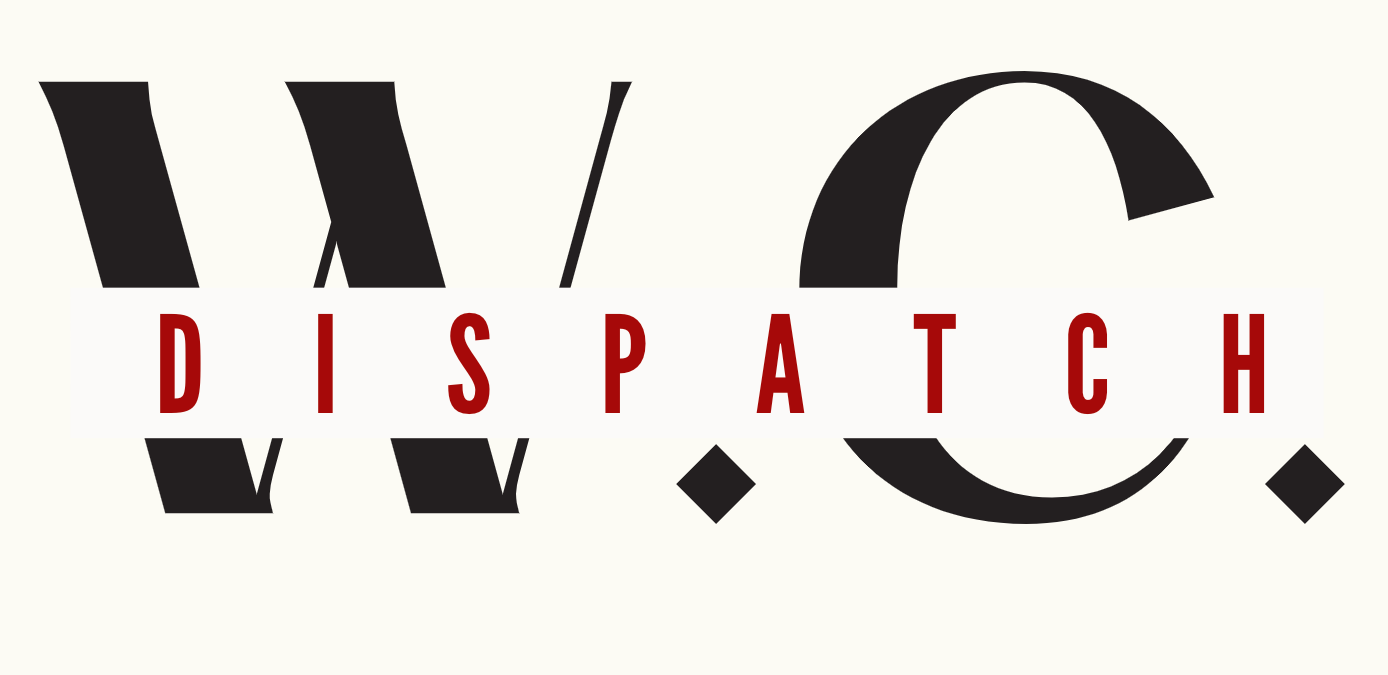
Good newsletter! Thanks, Walt.